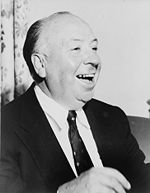Alfred Hitchcock: Difference between revisions
imported>Yi Zhe Wu mNo edit summary |
imported>Hayford Peirce (moved pic to left, added TOC to top right) |
||
| Line 1: | Line 1: | ||
[[Image:Hitchcock.jpg| | {{TOC-right}} | ||
[[Image:Hitchcock.jpg|left|thumb|150px|{{#ifexist:Template:Hitchcock.jpg/credit|{{Hitchcock.jpg/credit}}<br/>|}}Alfred Hitchcock]] | |||
'''Sir Alfred Joseph Hitchcock''' (13th August 1899 - 29th April 1980) was an [[English people|English]]-born [[film]] [[director (film)|director]] who achieved great success in [[Hollywood]], creating some of most celebrated thrillers of his day, which earned him the popular title of the "master of suspense". His films, typically cast with Hollywood's biggest stars, were technically advanced and often emotionally powerful, and were designed as crowd-pleasing entertainment for general adult audiences. Late in his long career he created what may be his most famous cinematic moment, the shocking murder of a woman in the shower in ''[[Psycho (film)|Psycho]]'' (1960). Describing his own style, he once famously remarked, "Drama is life with the dull bits left out." Nominated five times for an [[Academy Award]] for Best Director, he was one of the most celebrated film directors never to win the prize. A portly fellow with a striking profile and deep droll voice, he also achieved the unprecedented status of being the most well-recognized film director in [[History of cinema|cinema history]]. | '''Sir Alfred Joseph Hitchcock''' (13th August 1899 - 29th April 1980) was an [[English people|English]]-born [[film]] [[director (film)|director]] who achieved great success in [[Hollywood]], creating some of most celebrated thrillers of his day, which earned him the popular title of the "master of suspense". His films, typically cast with Hollywood's biggest stars, were technically advanced and often emotionally powerful, and were designed as crowd-pleasing entertainment for general adult audiences. Late in his long career he created what may be his most famous cinematic moment, the shocking murder of a woman in the shower in ''[[Psycho (film)|Psycho]]'' (1960). Describing his own style, he once famously remarked, "Drama is life with the dull bits left out." Nominated five times for an [[Academy Award]] for Best Director, he was one of the most celebrated film directors never to win the prize. A portly fellow with a striking profile and deep droll voice, he also achieved the unprecedented status of being the most well-recognized film director in [[History of cinema|cinema history]]. | ||
Revision as of 22:40, 1 November 2007
Sir Alfred Joseph Hitchcock (13th August 1899 - 29th April 1980) was an English-born film director who achieved great success in Hollywood, creating some of most celebrated thrillers of his day, which earned him the popular title of the "master of suspense". His films, typically cast with Hollywood's biggest stars, were technically advanced and often emotionally powerful, and were designed as crowd-pleasing entertainment for general adult audiences. Late in his long career he created what may be his most famous cinematic moment, the shocking murder of a woman in the shower in Psycho (1960). Describing his own style, he once famously remarked, "Drama is life with the dull bits left out." Nominated five times for an Academy Award for Best Director, he was one of the most celebrated film directors never to win the prize. A portly fellow with a striking profile and deep droll voice, he also achieved the unprecedented status of being the most well-recognized film director in cinema history.
Filmography
Hitchcock in England
|
|
Hitchcock in Hollywood
|
|
Wartime documentaries
Hitchcock produced two films for the UK Ministry of Information:
- Bon Voyage (1944)
- Aventure Malagache (1944)
Bibliography
Allen, R., and I. Gonzales (eds). Alfred Hitchcock: Cententary Essays (London: BFI Publishing, 1999).
Allen, R., and I. Gonzales (eds). Past and Future Hitchcock (London: BFI Publishing, 2004).
Barr, Charles. English Hitchcock (Cameron and Hollis, 1999).
Bellour, Raymond. Analysis of Film (Bloomington: Indiana UP, 2000).
Boyd, David (ed). Perspectives on Alfred Hitchcock (NY: GK Hall, 1995).
Brill, Lesley. The Hitchcock Romance (Princeton, N.J.: Princeton University Press, 1988).
Condon, P. and J. Sangster. The Complete Hitchcock (Virgin Publishing, 1999).
Corber, Robert. In the Name of National Security: Hitchcock, Homophobia, Politics (Durham: Duke UP, 1993).
Deutelbaum, M. and L. Poague. A Hitchcock Reader (Ames: Iowa University Press, 1986).
Fawell, J. Hitchcock’s Rear Window (Carbondale: Southern Illinois University Press, 2001).
Finler, Joel W. Hitchcock in Hollywood (NY: Continuum, 1992).
Freedman, J. and R. Millington (eds). Hitchcock’s America (New York: Oxford University Press, 1999).
Gottlieb, S. (ed). Hitchcock on Hitchcock (Berkeley: University of California Press, 1995).
Haeffner, Nicholas. Alfred Hitchcock (New York: Longman, 2005).
Kirkham, Pat. Saul Bass: A life in film and design (London: Laurence King Publishing, 2005).
Kraft, Jeff and Aaron Leventhal. Footsteps in the Fog: Alfred Hitchcock’s San Francisco (Santa Monica, CA: Santa Monica Press, 2002).
Leff, Leonard. Hitchcock and Selznick (New York: Weidenfeld & Nicolson, 1987).
Modleski, Tania. The Women who Knew Too Much (New York: Methuen, 1988).
Morris, Charles. The Hanging Figure: On Suspense and the Films of Alfred Hitchcock (NY: Praeger, 2002).
Naremore, James (ed) North by Northwest (New Brunswick, N.J.: Rutgers University Press, 1993).
Paglia, Camille. The Birds (London: BFI, 1999).
Rebello, S. Alfred Hitchcock and the Making of Psycho (New York: St. Martin’s Griffin, 1998).
Rothman, William. Hitchcock: The Murderous Gaze (Cambridge, Mass: Harvard UP, 1982).
Ryall, Tom. Alfred Hitchcock and the British Cinema (Urbana: University of Illinois Press, 1986).
Sterritt, D. The Films of Alfred Hitchcock (Cambridge, 1993).
Spoto, Donald. The Dark Side of Genius: The Life of Alfred Hitchcock (Boston: Little Brown, 1983).
Taylor, John Russell. Hitch: The Life and Times of Alfred Hitchcock (New York: Pantheon, 1978).
Truffaut, François. Hitchcock (New York: Simon & Schuster, 1967).
Wood, Robin. Hitchcock's Films Revisited (New York: Columbia University Press, 2002).
Zizek, Slavoj. Everything you always wanted to know about Jacques Lacan ... but were afraid to ask Alfred Hitchcock (New York: Verso, 1992).
